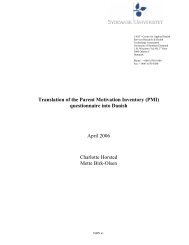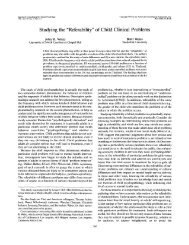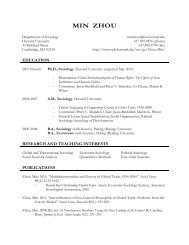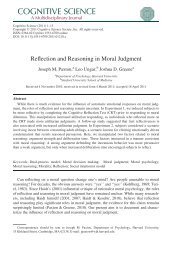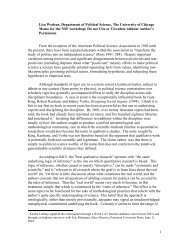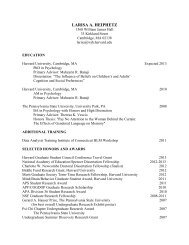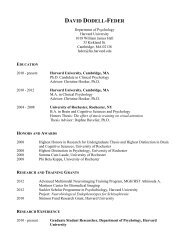A Guide to Writing a Senior Thesis in Sociology - WJH Home Page ...
A Guide to Writing a Senior Thesis in Sociology - WJH Home Page ...
A Guide to Writing a Senior Thesis in Sociology - WJH Home Page ...
Create successful ePaper yourself
Turn your PDF publications into a flip-book with our unique Google optimized e-Paper software.
and social groups come <strong>to</strong> be? Why do some positions hold more power than others?<br />
How do we assess which <strong>in</strong>dividuals should fill these roles? How is power perpetuated<br />
by systems and/or <strong>in</strong>dividuals?<br />
How narrow should the research question be? The end product of your thesis is<br />
60-100 pages, with 1-3 chapters (20-50 pages) describ<strong>in</strong>g your f<strong>in</strong>d<strong>in</strong>gs. You will be<br />
work<strong>in</strong>g on the paper for 7-10 months. Your <strong>to</strong>pic should be a specific question that<br />
lends itself <strong>to</strong> 1-3 sub-questions <strong>to</strong> discuss <strong>in</strong> your f<strong>in</strong>d<strong>in</strong>gs chapters, and it should also<br />
be broad enough <strong>to</strong> susta<strong>in</strong> a nearly year-long project. (Typically students have more<br />
trouble develop<strong>in</strong>g a narrow-enough <strong>to</strong>pic rather than a broad-enough <strong>to</strong>pic!)<br />
Your question must be testable with empirical data. If you are go<strong>in</strong>g <strong>to</strong> write a theoretical<br />
thesis (which is rarely undertaken by concentra<strong>to</strong>rs), you may not be actually<br />
test<strong>in</strong>g the question, but it has <strong>to</strong> be someth<strong>in</strong>g that could be tested by others, given the<br />
right data source.<br />
With this <strong>in</strong> m<strong>in</strong>d, how should you move from <strong>to</strong>pic <strong>to</strong> research question?<br />
• Bra<strong>in</strong>s<strong>to</strong>rm several narrower “slices” of your <strong>to</strong>pic. Are you <strong>in</strong>terested <strong>in</strong> a particular group of<br />
people with<strong>in</strong> a <strong>to</strong>pic? What particular aspect of the <strong>to</strong>pic are you consider<strong>in</strong>g? Are you more <strong>in</strong>-<br />
terested <strong>in</strong> how people <strong>in</strong>terpret or feel about someth<strong>in</strong>g? Or are you more <strong>in</strong>terested <strong>in</strong> people’s<br />
outcomes?<br />
• Dur<strong>in</strong>g the bra<strong>in</strong>s<strong>to</strong>rm<strong>in</strong>g process, talk with your adviser, faculty members, graduate students,<br />
classmates, and friends. Don’t be afraid <strong>to</strong> say <strong>to</strong> your adviser, “I’m really <strong>in</strong>terested <strong>in</strong> the prison<br />
system and I would like <strong>to</strong> write a thesis on this. How can I beg<strong>in</strong>?”They may have a research ques-<br />
tion they th<strong>in</strong>k needs <strong>to</strong> be answered or can po<strong>in</strong>t you <strong>to</strong> relevant literature. Do not be afraid <strong>to</strong><br />
talk <strong>to</strong> a number of different faculty members about the same <strong>to</strong>pic or idea or about several <strong>to</strong>pics<br />
or ideas. Often their comments and questions will help you ref<strong>in</strong>e the <strong>to</strong>pic further; sometimes we<br />
don’t realize th<strong>in</strong>gs aren’t clear until we try <strong>to</strong> expla<strong>in</strong> it <strong>to</strong> someone else!<br />
• Dur<strong>in</strong>g this time, you should also start <strong>to</strong> read broadly on your <strong>to</strong>pic. You are not undertak<strong>in</strong>g a<br />
literature review quite yet, but often read<strong>in</strong>g through what has been done will lead you <strong>to</strong> ques-<br />
tions that have not been satisfac<strong>to</strong>rily answered, debates that cont<strong>in</strong>ue <strong>to</strong> occur, an implication or<br />
follow-up <strong>to</strong> an argument that has not been explored, or a question that you th<strong>in</strong>k can be explored<br />
with different methodology.<br />
o One place <strong>to</strong> look is the Annual Review of <strong>Sociology</strong>, a journal comprised of literature<br />
reviews. If there is a piece on your broad <strong>to</strong>pic, it might identify the major debates or sub-<br />
fields. You can also ask your adviser for a list of the major books or works on the <strong>to</strong>pic. As<br />
you work through the major literature, focus your read<strong>in</strong>g <strong>in</strong> an <strong>in</strong>creas<strong>in</strong>gly narrow area.<br />
Scan footnotes for further references that may lead you <strong>to</strong> a work that sparks your specific<br />
<strong>in</strong>terest.<br />
• After bra<strong>in</strong>s<strong>to</strong>rm<strong>in</strong>g several narrower <strong>to</strong>pics, start develop<strong>in</strong>g questions. A research question<br />
should be specific: What is the specific phenomenon you are <strong>in</strong>terested <strong>in</strong>? For whom? In what<br />
way? For example, if you are <strong>in</strong>terested <strong>in</strong> the educational atta<strong>in</strong>ment of immigrant students, what<br />
specific outcome are you <strong>in</strong>terested <strong>in</strong>? For what group of immigrants? What do you want <strong>to</strong> ex-<br />
am<strong>in</strong>e that relates <strong>to</strong> this outcome—language? Culture? Social <strong>in</strong>tegration?<br />
A <strong>Guide</strong> <strong>to</strong> <strong>Writ<strong>in</strong>g</strong> a <strong>Senior</strong> <strong>Thesis</strong> <strong>in</strong> <strong>Sociology</strong> | page 9




